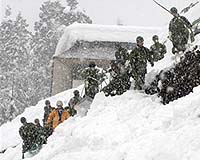| . |  |
. |
Vientiane, Laos (UPI) Nov 16, 2010 Stockpiles of cluster bombs will be phased out worldwide within a decade, cleaning up areas contaminated with the unexploded weapons and helping victims of the bombs, an international pact decrees. The landmark agreement was reached by a string of nations represented in Laos this week. The agreement comes on the heels of a convention on cluster munitions that became international law Aug. 1. Under that pact countries affected by cluster bombs are entitled to financial aid, banning use of the weapons which have killed or seriously maimed thousands of people worldwide. The convention obliges state parties to ban the use, stockpiling, production and transfer of cluster bombs within 10 years. Government representatives, party to the pact, agreed to a 66-point action plan to end the cluster bomb threat during the Vientiane meeting this week. The agreement also contains provisions that enhance cooperation with international organizations and governments in pursuit of a global ban on cluster munitions. Among the targets set during the Vientiane meeting was creating a timeline and budget for destroying stockpiles of cluster bombs, said Thomas Nash, coordinator of the Convention on Cluster Munitions. "The donor countries have agreed to ensure that the pace and effectiveness of victim assistance, clearance and stockpile destruction activities increase in 2011," he said. During the conference, Austria became the eighth nation to announce that it had completed the destruction of its stockpiles of cluster bombs. Steve Goose, director of the arms division of Human Rights Watch, said that the Laos summit was an important step on the road to the complete elimination of cluster bombs. "The countries that took part in this meeting made it clear that they understand how important and urgent it is to help countries affected by these weapons get rid of them," he said in a statement issued by the human rights group. Dropped from the ground or detonated on ground, cluster bombs split open before impact, ejecting smaller bombs over a wide area. The bomblets are about the size of a tennis ball and many fail to explode, left hidden for decades and posing threat to unsuspecting farmers and children. The United States, China, Israel and Vietnam are among the countries that haven't signed the convention. The Vientiane convention marked the first meeting of the 46 states that are party to the convention. More than 1,000 government representatives and military officials attended. Lebanon is due to host the second annual convention in September.
Share This Article With Planet Earth
Related Links The latest in Military Technology for the 21st century at SpaceWar.com
 S.Korea designs high-tech winter gear for front-line troops
S.Korea designs high-tech winter gear for front-line troopsSeoul (AFP) Nov 15, 2010 South Korean soldiers on the front line with North Korea will be able to bundle up this winter in new high-tech heat-generating parkas, the defence ministry said Monday. The winter parkas have a rechargeable battery-powered device installed in an inside pocket that can generate heat for up to six hours with a single charge. They have been issued to soldiers at front-line guard posts sinc ... read more |
|
| The content herein, unless otherwise known to be public domain, are Copyright 1995-2010 - SpaceDaily. AFP and UPI Wire Stories are copyright Agence France-Presse and United Press International. ESA Portal Reports are copyright European Space Agency. All NASA sourced material is public domain. Additional copyrights may apply in whole or part to other bona fide parties. Advertising does not imply endorsement,agreement or approval of any opinions, statements or information provided by SpaceDaily on any Web page published or hosted by SpaceDaily. Privacy Statement |